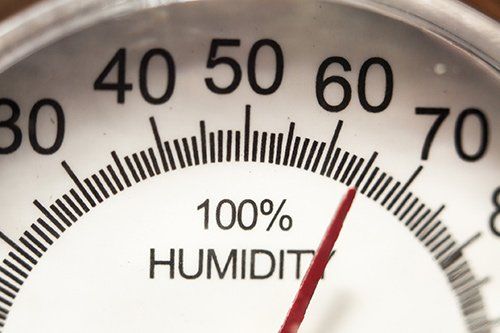5 Things That Can Cause High Humidity Levels in Your Home
- By Admin
- •
- 08 Jun, 2018

Dealing with humidity in your home can make you miserable. After all, humidity can make you feel hot, sticky and uncomfortable. Plus, excessive humidity levels in your home can cause mold and mildew growth and other issues.
The humidity levels inside of your home should range from approximately 30% to 50%. Ideally, they should hover around 45%. You can check the humidity levels in your home with a hygrometer to determine if they are within the appropriate range. If your humidity levels are higher than they are supposed to be, then it could be because of one of these five things.
1. Humid Outdoor Weather
First of all, you can expect humidity levels to be a bit higher in your home when the outdoor weather is more humid. Many areas have humid climates during the summer months. Even climates that are not usually particularly humid can be more humid than usual after periods of heavy rain.
Of course, there is nothing that you can do to prevent high humidity levels outside. You can help reduce the impact that the outdoor humidity levels have inside of your home, though. Keeping your windows and doors closed when it's humid outside is a good start.
To take things a step further, you can install new seals around windows and doors to help keep the humidity out. This can also help you save on your cooling bills during the hot and humid summer, so it's a worthwhile project to look into.
2. Showering
Taking a long, hot shower might feel refreshing, but it can cause the humidity levels in your bathroom to increase. Without proper ventilation, the humidity can cause mold growth in your bathroom, and the humidity can spread throughout the rest of your home as well.
Using your exhaust fan while showering and directly afterward can be a good way to remove the humidity from the bathroom. If you do not have an exhaust fan in your bathroom, you can always crack a window for a similar effect. If conditions are humid outside as well, however, this might not be as effective as using the exhaust fan.
3. Cooking
Cooking is another way that you can cause higher humidity levels in your home. Of course, in many homes, there is a simple solution for this: just turn on the exhaust fan above your stove, and it should help get rid of some of the humidity. As with in the bathroom, you can crack a window in your kitchen to get rid of some of the humidity if you don't have an exhaust fan in the kitchen.
4. HVAC System That Isn't Functioning Properly
Modern air conditioners are designed to help with removing excess humidity from the air while cooling the home at the same time. If your air conditioner isn't working properly, however, it might not do a good job of removing humidity from the air. If you have noticed that your home is more humid than it usually is during similar weather conditions, it could be because of your air conditioning system.
Having your air conditioner looked at by a professional can help you get it back in good shape again. Then, you can both get help with reducing your humidity levels and can help prevent breakdowns and other issues with your air conditioning system.
5. Lack of a Dehumidifier
In humid climates, sometimes even a well-functioning air conditioning system can't keep up. If this is the case, consider installing a whole-house dehumidifier in your home. This is a worthwhile investment, since it can help you lower humidity levels all throughout your home. This can be an effective way of preventing the discomfort and household damage that can go along with high humidity.
As you can see, there are various things that can cause the humidity levels in your home to rise. Determine if any of these causes could be contributing to the higher humidity levels in your home, and you can then take steps to help remedy this uncomfortable problem.